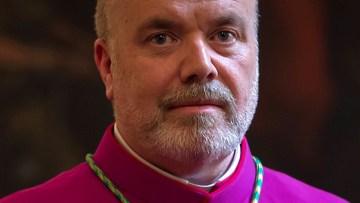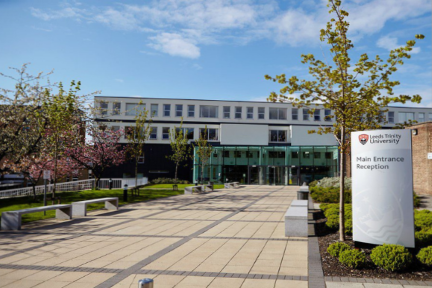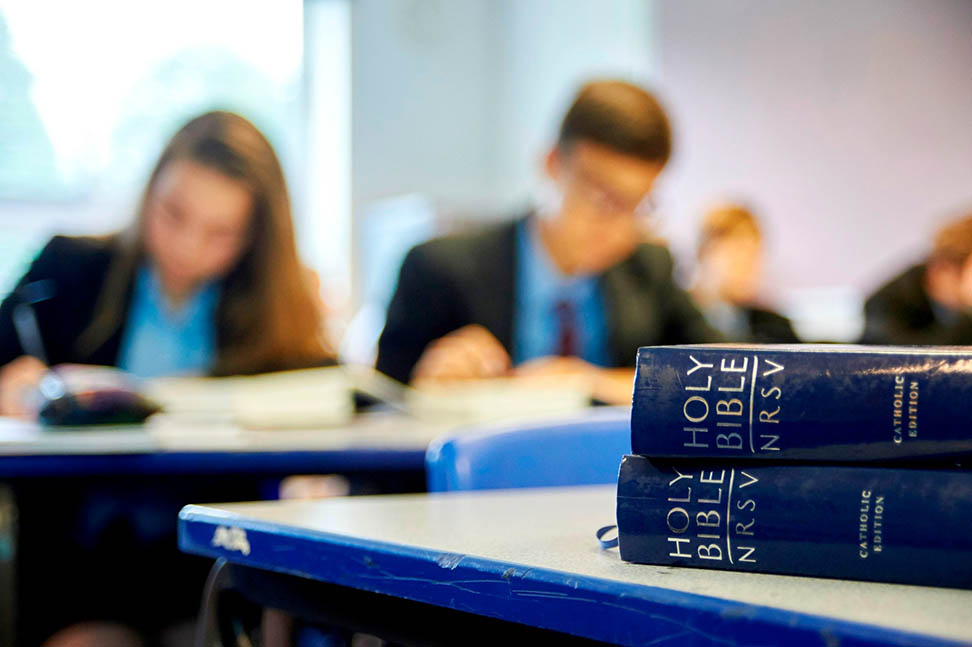CES statement on The Bloom Review: does government ‘do God’?
Amid a national Religious Education (RE) teacher shortage we welcome The Bloom Review and its clear evidence that RE is vital for children and young people to learn.
RE is the core of the core curriculum and Catholic schools dedicate at least 10% of the timetable to this essential subject, while the Church’s RE curriculum and inspection framework are recognised as models of best practice.
There are 2,175 Catholic schools, colleges and academies across England and Wales, representing just under 10% of state education. Catholic pupils achieve the highest GCSE RE results in the country, and represent a quarter of all entrants. The past year has seen the launch of a new RE curriculum and national inspection framework to ensure that the quality of RE in all Catholic schools remains high. We are happy to share our Catholic approach to ensuring high quality RE to help improve RE teaching as a whole.
The Catholic Education Service is committed to continued working with the Government in support of Catholic education, high-quality RE and increased religious literacy in the Government and the wider public sector.
Easter message from Bishop Marcus to schools

Dear Brothers and Sisters in Christ,
At this stage in the calendar, when we draw close to the summit of the Liturgical Year - the Sacred Paschal Triduum, we celebrate with reverence the passion and death of our Lord and Saviour Jesus Christ, and we look forward with joy to celebrating at the Easter Vigil on Holy Saturday night and on Easter Sunday morning his resurrection from the dead.
As we come to the end of this term, it is also a time for many students in our schools which coincides with an intense period of study in preparation for examinations in the summer. For young people, it is a time of hope but it can be a time of anxiety also. What is most important though, is that their time in school is a time when they can flourish: in mind, body and spirit. Christ came that we might have life and have it to the full. The flourishing of young lives through Catholic education is indebted to the years of dedication and commitment given by school leaders, teachers, learning assistants, chaplains and by all the staff and governors of our schools.
On the threshold of Holy Week, we catch sight of the new life in Christ which his death and resurrection holds out to us and to the world. It is a vision which we glimpse in the prayers and liturgy taking place in schools and churches up and down the land.
I give thanks to Almighty God for the noble vocation of all of you who work and serve in our schools. I pray that you, your families and your loved ones will receive many blessings from the Lord during this great Solemn Feast of Easter, and that it will be a time of joy and thanksgiving for you all.
With the assurance of my prayers, I remain,
Your servant in our Lord Jesus Christ,
Rt Rev Marcus Stock
Chair of the Catholic Education Service
Bishop of Leeds
Catholic universities respond to post-pandemic alienation, injustice and market economics

Rehumanising a world of post-pandemic volatility is a theme running through a new, free online lecture series from a Catholic university.
Beyond The Dark Clouds, hosted by Leeds Trinity University from April to November, sees 12 lectures from UK and international contributors including a former government minister, centred around justice in contested issues such as the police, law enforcement, business ethics, spirituality, the arts and more.
The title is drawn from ‘dark clouds over a closed world’, a phrase used by Pope Francis in his 2020 encyclical Fratelli Tutti. In this the Pope refers to the ‘desensitised human conscience’ as among the chief causes of global crises, that “local conflicts and disregard for the common good are exploited by the global economy in order to impose a single cultural model...the advance of this kind of globalism strengthens the identity of the more powerful.”
Positioning Catholic higher education as a platform to return religious tradition and thought to public debate, the series features talks on policing, from the internationally renowned Dr Tobias Winright, Professor of Moral Theology at St Patrick’s Pontifical University, Ireland, and from former Chief Superintendent Tony Blockley, now Head of Criminology and Policing at Leeds Trinity University.
Economics, justice and Catholic social teaching are addressed by Philip Booth, Professor of Public Policy at St Mary’s University; and former Labour government Trade and Industry, and Foreign and Commonwealth Affairs minister, Sir John Battle, discusses the Church in the wider, secular, world.
Each lecture is recorded and then uploaded as a podcast to both Spotify and Apple.
Professor Charles Egbu, Vice Chancellor of Leeds Trinity University, said: “We are pleased to have the participation of such a prestigious line-up of speakers for our lecture series, and look forward to discussing some key social issues affecting communities today and how the Catholic university can be a vehicle for change and progress.”
Dr Ann Marie Mealy, Director of Catholic Mission at Leeds Trinity University, said: “Much of the suffering and alienation that people felt during lockdown has not yet been acknowledged fully or discussed openly, and we should acknowledge the need for healing more.
“Many of us at Leeds Trinity share the Church’s desire to get involved in public discussions about how to humanise our world, and to bring about the conditions that enable the flourishing of all individuals and groups – please join us.”
Find out more - to register for attendance, please contact This email address is being protected from spambots. You need JavaScript enabled to view it.
Catholic schools come top for GCSE RE exam results - data

Catholic schools’ GCSE Religious Education (RE) exam results are the best in the country, according to the latest data.
Analysis by the Catholic Education Service (CES) of GCSE RE attainment for 2022 has shown that results from Catholic schools have overtaken the national average for the exams.
Last year 75.2% of Catholic school RE GCSE candidates scored a C+ or grade 4, compared to 68.3% nationally.
The results at A Level were more comparable, however, with 66.9% achieving A* or B in Catholic schools, compared to 67.7% in all schools.
Just over a quarter (25.6%) of all pupils who sat GCSE RE exams last year were from Catholic schools, while the proportion was 9.8% at A Level.
Across England and Wales there are 2,175 Catholic schools, colleges and academies, which educate more than 849,000 pupils.
This represents 9% of the state sector in England and 6% in Wales.
Philip Robinson, CES RE Adviser, said: “This is good news, and testament to the hard work of RE teachers and students in Catholic education.
In a society both increasingly secular and religiously pluralistic, RE has an essential role in enabling respectful dialogue on contentious issues like faith and science; refugees and asylum seekers; war and peace.”
The CES has recently launched a new RE Directory, for introduction from 2025 – find out more.

